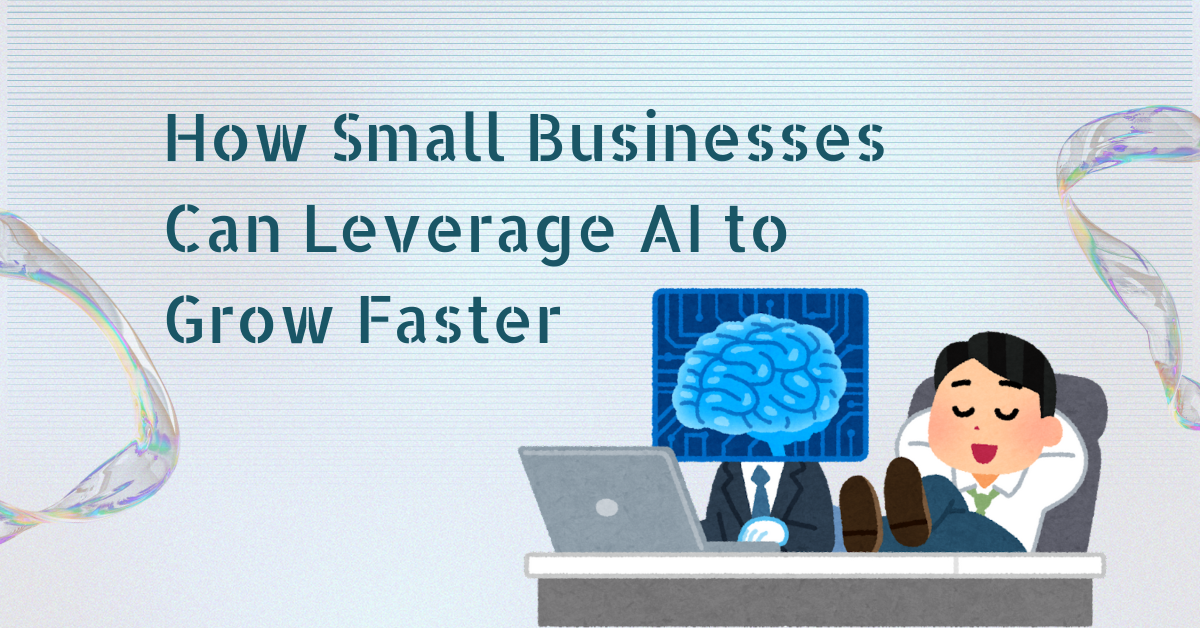Artificial intelligence (AI) has transformed industries across the globe, offering innovative solutions to complex challenges. For small businesses, AI represents a significant opportunity to level the playing field with larger competitors, streamline operations, and drive growth. From automating mundane tasks to enhancing customer experiences, AI can empower small businesses to achieve more with fewer resources. In this article, we explore how small businesses can leverage AI to grow faster and achieve sustainable success.
The Role of AI in Modern Business
AI has moved beyond the realm of science fiction to become an integral part of our daily lives and business operations. With the advent of affordable AI tools and platforms, small businesses can now access technologies that were once exclusive to large corporations. By embracing AI, small businesses can:
- Improve Operational Efficiency: Automating repetitive tasks and processes saves time and reduces costs.
- Enhance Decision-Making: AI-powered analytics provide valuable insights to guide strategic decisions.
- Boost Customer Engagement: Personalized experiences driven by AI improve customer satisfaction and loyalty.
Key Areas Where Small Businesses Can Use AI
1. Customer Service Automation
Chatbots and virtual assistants powered by AI can handle customer inquiries 24/7, providing instant responses and freeing up human resources for more complex tasks. Tools like Zendesk AI and Intercom make it easy for small businesses to implement chatbots without requiring technical expertise.
- Benefits:
- Faster response times.
- Reduced operational costs.
- Improved customer satisfaction.
2. Marketing and Personalization
AI tools can analyze customer data to create highly targeted marketing campaigns. Platforms like HubSpot and Mailchimp use AI to suggest email content, segment audiences, and optimize campaign performance.
- Key AI Applications in Marketing:
- Predictive analytics for identifying potential customers.
- Dynamic content creation for personalized user experiences.
- Social media listening to understand customer sentiment.
3. Sales Optimization
AI can help small businesses optimize their sales processes through lead scoring, sales forecasting, and pipeline management. For example, Salesforce Einstein uses AI to identify promising leads and recommend actions to close deals faster.
- Impact:
- Higher conversion rates.
- More efficient sales strategies.
4. Operational Efficiency
AI can streamline back-office operations such as accounting, inventory management, and supply chain logistics. Tools like QuickBooks Online and Xero integrate AI to automate bookkeeping and provide real-time financial insights.
Leveraging AI for Content Creation
1. AI-Powered Writing Tools
Creating high-quality content is essential for building brand awareness and driving traffic to your website. AI writing tools like Jasper and Grammarly can help small businesses generate engaging blog posts, social media updates, and marketing copy.
- Benefits:
- Faster content production.
- Error-free writing.
- Enhanced creativity through AI suggestions.
2. Content Detection Tools
As businesses increasingly rely on AI-generated content, it’s crucial to ensure originality and authenticity. Content detection tools can identify AI-generated text, helping businesses maintain credibility and meet SEO requirements.
- Popular Content Detection Tools:
- Copyleaks AI Content Detector.
- Originality.ai.
- Writer’s AI Content Detector.
Using these tools ensures your content aligns with human-like writing standards, which is vital for search engine optimization and audience trust.
3. AI Image Generators
Visual content plays a significant role in capturing attention and conveying brand messages. AI image generators like DALL-E and Canva’s AI tools allow businesses to create professional-grade visuals without hiring graphic designers.
- Applications:
- Designing social media posts.
- Creating unique product images.
- Enhancing website visuals.
AI Tools for Enhanced Customer Insights
1. Customer Data Analysis
AI-powered tools can analyze customer behavior, preferences, and purchasing patterns, providing actionable insights for small businesses. Google Analytics and Tableau are excellent platforms for leveraging AI-driven data analysis.
- Use Cases:
- Identifying high-value customers.
- Personalizing product recommendations.
- Anticipating market trends.
2. Sentiment Analysis
AI tools like MonkeyLearn and Lexalytics can analyze customer feedback, reviews, and social media comments to gauge sentiment. This helps businesses understand their customers better and address concerns proactively.
AI for Employee Productivity
1. Task Automation
Repetitive administrative tasks such as scheduling, data entry, and email management can be automated using AI tools like Zapier and Microsoft Power Automate. This allows employees to focus on strategic initiatives.
2. Training and Skill Development
AI-based e-learning platforms like Coursera and Udemy use adaptive learning algorithms to provide personalized training experiences. Small businesses can use these platforms to upskill their workforce without significant investments.
Overcoming Challenges in AI Adoption
While the benefits of AI are undeniable, small businesses may face challenges in adopting this technology:
- Cost: Investing in AI tools and infrastructure can be expensive initially.
- Technical Expertise: Many small businesses lack the expertise to implement and manage AI solutions.
- Data Privacy Concerns: Ensuring the security and privacy of customer data is critical when using AI.
Solutions:
- Start Small: Begin with affordable, easy-to-use AI tools that address specific pain points.
- Leverage Free Resources: Utilize free online tutorials and communities to build AI knowledge.
- Partner with Experts: Collaborate with AI consultants or agencies to implement solutions effectively.
The Future of AI for Small Businesses
AI is evolving rapidly, and its potential applications for small businesses continue to grow. Emerging technologies like generative AI, voice recognition, and augmented reality will further expand opportunities for small businesses to innovate and stay competitive.
By staying informed and embracing AI strategically, small businesses can unlock new levels of efficiency, creativity, and growth. As AI becomes more accessible, the time to act is now. Small businesses that leverage AI effectively will be well-positioned to thrive in the ever-changing digital landscape.
Conclusion
AI is no longer a luxury reserved for large corporations. Small businesses can harness the power of AI to automate tasks, enhance customer experiences, and make data-driven decisions. By adopting AI tools for marketing, operations, content creation, and customer insights, small businesses can achieve rapid growth and stand out in competitive markets.
While challenges exist, they are outweighed by the immense opportunities AI offers. With careful planning and a commitment to innovation, small businesses can use AI to build a brighter, more successful future.
Also Read
- ► Maximizing Efficiency with Software CMMS: A Complete Guide
- ► Pin-Up платформасы – Қауіпсіздік, Төлемдер және Бонустар
- ► Prêt rapide sans contrôle de crédit : vos besoins, nos solutions
- ► Top Platforms for Online Artificial Jewellery Shopping in Pakistan You Must Try
- ► Understanding Submersible Pumps manufacturing process and quality control
- ► Everything You Need to Know About NAD IV Bags
- ► Auto Mechanic course in Rawalpindi
- ► The Link Between Instagram Biographies And New Connections
- ► The Web Of Instagram Biographies And Particular Connections
- ► Tips to Tackle Distractions While Preparing for Government Exams
- ► How Can You Measure the ROI of Whatsapp Marketing in India?
- ► Stüssy Staples: Iconic Pieces for Every Wardrobe
- ► How to Apply for an Overdraft Loan in India and the Pros and Cons of This Financial Option
- ► What is the Best Online MBA in Healthcare Management in India?
- ► Two Piece Boxes: Combining Functionality and Elegance




